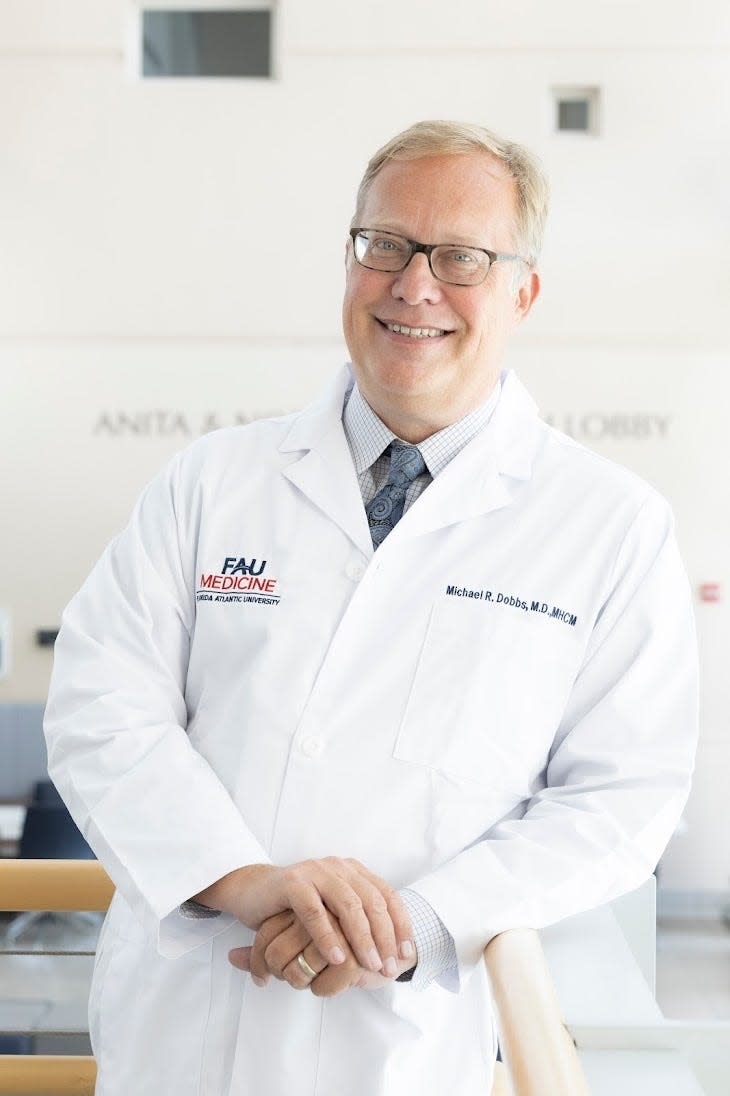FAU receives $11.5 million donation for amyloidosis research: What does it mean for the school?
BOCA RATON — Amyloidosis is a rare disease caused by the buildup of an abnormal protein. It is life-threatening, and there is no known cure.
But with an $11.5 million donation to Florida Atlantic University in July, Boca Raton philanthropists Ann and John Wood will help advance research on the disease. The donation will allow the university’s Schmidt College of Medicine to create the FairfaxWood Health and Innovation Technology Initiative.
The initiative will focus on the FAU Amyloidosis Project, designed to create a “game-changing infrastructure that will combat amyloidosis using a collaborative, whole-body approach,” a news release from the university said.

What does the donation mean for FAU?
The FairfaxWood Health and Innovation Technology Initiative will be based on a collaborative model made up of clinicians, researchers and world-class institutes. This team will work to find what causes the formation of amyloid fibrils — the abnormal protein — in the body.
“We are eternally grateful to Ann and John Wood for their vision, generosity and continued support of our medical school through this extraordinary gift,” FAU President Stacy Volnick said. “The FairfaxWood Health and Innovation Technology Initiative will transform the way our researchers and clinicians study and treat amyloidosis and other serious medical conditions that require a synergistic approach to improve health and quality of life.”
Using artificial intelligence and the latest data science, single organ-focused researchers and clinicians will work on conducting research for treatments and, ultimately, finding a cure for the rare disease.
What are the warning signs of amyloidosis?
Amyloidosis is caused by a buildup of amyloid proteins — abnormal proteins typically produced in a person’s bone marrow — in the heart, kidneys, liver or brain. The most common localized form of it is in the brain and can present itself in Alzheimer’s disease and related dementias, or in brain bleeds that can lead to a stroke.
Symptoms depend on which organs the proteins affect. Warning signs of amyloidosis, according to Johns Hopkins University, include:
Feeling weak or tired
Unexpected loss of weight
Swelling in the belly, legs, ankles or feet
Numbness, pain or tingling in the hands or feet
Easily bruised skin
Purple spots or bruised-looking areas of skin around the eyes
Bleeding more than usual after surgery
Increased tongue size
Shortness of breath
Who does amyloidosis affect?
According to the Cleveland Clinic, amyloidosis affects an estimated nine to 14 of every million people in the United States and five to 12 of every million people worldwide. There are fewer than 200,000 cases in the United States per year.
Almost 70% of amyloidosis cases are in men, Johns Hopkins said. Some forms of the disease are more likely to appear in people with infections or other conditions causing chronic inflammation. The disease can exist on its own or be related to another health problem.
There are several ways to test for amyloidosis, but an effective approach is when providers take biopsies of affected organs. These can include a bone marrow, kidney, heart or fat pad biopsy.
Where does the donation come from?
The donation marks the fourth contribution to FAU’s College of Medicine from the Woods, who created the FairfaxWood Scholarship Foundation.

It follows a $28 million scholarship gift in 2022 to support medical education and create a chance for debt-free tuition for aspiring physicians in honor of one of the Woods’ sons. It was the largest scholarship gift in the school’s history and the largest known scholarship gift to a Florida public university’s medical school, according to FAU.
“Philanthropy has an increasingly important role in advancing science and supporting vital research initiatives that have implications for people not just locally but across the globe, especially when it involves an illness or condition that is complex, multifactorial and difficult to treat,” a statement from the Woods said. “Amyloidosis in particular, is a disease that has personally impacted our family, and why we decided to invest in this initiative to usher in a new era to treat this disease, hopefully find a cure, and most importantly, provide patients with hope.”
John is a U.S. Navy veteran and engineering graduate of New York University, and Ann grew up in Trinidad and received her medical training in London. The pair relocated to Boca Raton in 1983 after spending 18 years in the concrete business and in building bridges, piers and cruise ship terminals throughout the Caribbean. They continued to run their family-owned prestressed concrete firm from Boca Raton until its sale in 2005.
More on the FairfaxWood Health & Innovation Technology Initiative:
Integral to the initiative will be the establishment of the inaugural, endowed FairfaxWood Chair of Clinical Neurosciences, which will be held by neurologist Dr. Michael R. Dobbs. He oversees research, faculty and programs within the medical school’s newly created Clinical Neurosciences Department, and will direct “discovery to cure” initiatives for amyloidosis and other identified complex disorders. He’ll also be responsible for the program’s external outreach across the amyloidosis and related diseases spectrum.

“I am both honored and excited to have been selected as the first endowed FairfaxWood Chair of Clinical Neurosciences,” Dobbs, an expert in vascular neurology, said. “As chair, I will work with a team of esteemed researchers and clinicians to gain a deeper understanding of the cause of amyloid fibril creation and how to prevent this amyloid buildup using medical mediations and discovering a means to dissolve existing amyloid fibril deposits.”
Since amyloidosis does not affect one organ in particular, finding the underlying cause of amyloid fibril creation — a hallmark of the disease — can be complex and challenging.
Jasmine Fernández is a journalist covering Delray Beach and Boca Raton at The Palm Beach Post. You can reach her at jfernandez@pbpost.com and follow her on Twitter at @jasminefernandz. Help support our work. Subscribe today.
This article originally appeared on Palm Beach Post: FAU receives $11.5 million donation to combat life-threatening disease

